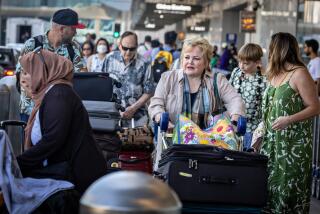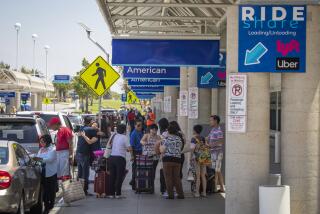Separate TSA screening for airline crews in the works
A plan to get airline crew members through airport security quicker is in the works and could lead to somewhat faster lines for passengers.
The Transportation Security Administration recently announced plans to begin testing an identity verification program to let airline crews bypass the controversial full-body scanners and extra-thorough pat-down searches at airports.
The proposed program, TSA officials say, should — to a degree — speed up airport security lines for regular passengers by diverting the nation’s more than 100,000 pilots and flight attendants through a separate screening process.
Talks among the airlines, TSA and pilots unions over how to create an inexpensive but secure screening system for crew members had been stalled for years.
Details of the proposed system have yet to be worked out, but TSA officials say they plan to hook into airline employee databases and confirm the identities of pilots and flight attendants using biometric measures such as retina scans and fingerprint matching.
“When this program is fully implemented for flight attendants and pilots it will help make passenger screening more efficient and streamlined because the alternate screening will provide a separate checkpoint for crew members,” said Corey Caldwell, a spokeswoman for the Assn. of Flight Attendants, a union that represents nearly 50,000 flight attendants.
TSA officials announced that the agency would begin testing the program for pilots in some airports this year. Once the system is in place at airports across the country, flight attendants are to be added to the program.
Pilots and flight attendants have been calling for a separate screening system for years, but they pushed even harder last year after the TSA began to perform more thorough pat-down searches and install full-body scanners that use low levels of radiation to check for contraband hidden under clothing.
• US Airways to offer first class on regional flights
In the airline industry, big money comes not so much from ticket sales to leisure travelers, crammed in the economy seating, as from business travelers, who pay top dollar to enjoy free drinks and expensive meals in first class.
That may explain why Tempe, Ariz.-based US Airways has announced plans to add first-class sections on 110 of its regional aircraft by January.
Each of those US Airways planes will have eight or nine first-class seats. Passengers in the roomier leather seats can board earlier and get free alcoholic drinks, snacks, pillows and blankets.
The airline has yet to announce the price to upgrade to the first-class section but said it expects the new offering will generate a profit in the first year.
US Airways plans to replace such menu items as prepackaged sandwiches and cheese plates with heartier entrees, such as braised beef short ribs and roasted teriyaki chicken breast, in first class. Plus, the drinks will be served in glasses, not plastic cups.
US Airways is not the first major airline to go upscale on the smaller regional planes.
United Airlines launched a luxury-class section for its regional planes in 2006. Delta Air Lines launched a fleet of 77 regional planes with first-class seating in 2008 and expanded that last year to a total of 220 regional planes.
The regional carrier American Eagle, a subsidiary of American Airlines’ parent company, added nearly 50 regional jets with first-class seating last summer.
• Korean Air to add duty-free shops to planes
Korean Air believes it too has figured out a new way to squeeze more revenue out of passengers.
Later this summer, the Seoul-based air carrier is expected to become the world’s first airline to operate duty-free shops in the back of its planes. (Some airlines already sell duty-free items from carts rolled through the cabin.)
The shops on the airline’s Airbus A380s will replace 13 passenger seats and offer up to 64 items, including bottles of alcohol, cosmetics and perfumes.
And if you are seated near the duty-free shop, don’t worry about what will happen if the plane hits strong turbulence. All the bottles in the shop are to be fitted with magnets on the bottoms so they hold firm to the shop’s metal shelves.
More to Read
Sign up for Essential California
The most important California stories and recommendations in your inbox every morning.
You may occasionally receive promotional content from the Los Angeles Times.









